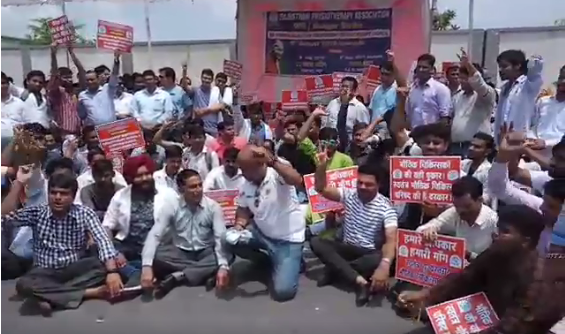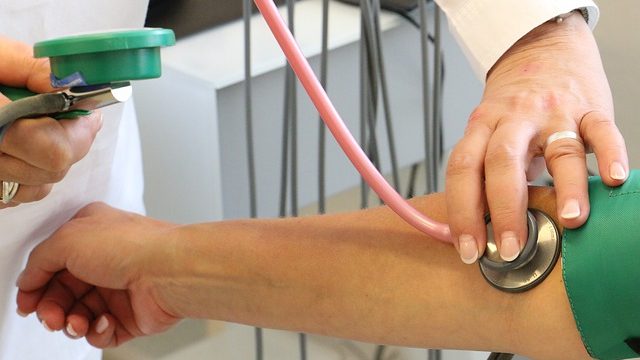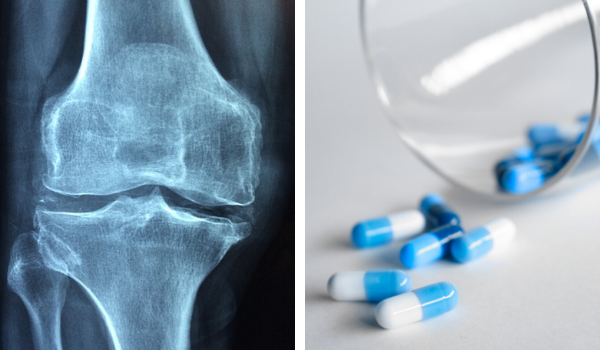
Independent central council for physiotherapist has been a long-standing demand which can give professional autonomy to the physiotherapist and better rehabilitation service to the common people.
But the recently proposed draft of “Clinical Establishment Act Standards for Physiotherapy Centre CEA /Physiotherapy Centre- 023” weakens the idea of physiotherapy professions autonomy.
There is a widespread disagreement of the current proposed act among the physiotherapist in the country and to protest it, 254 km foot march is going to be held from Dandi to Sabarmati Gandhi Ashram from 25th August 2019 to Sept 3rd 2019. The protest is under the banner of”Physio Swaraj March” headed by Dr. Umasankar Mohanty.
So, what does it mean for a physiotherapist like you and me, how the bill if passed can further weaken our professional autonomy?
Let us try to understand in this article.
How proposed draft affects physiotherapist?
The physiotherapist all over the country is unhappy with the proposed draft of the Clinical Establishment Act Standards for Physiotherapy Centre CEA /Physiotherapy Centre- 023.
The current draft has many points that clearly states that physiotherapy is an allied health profession which is not in accordance with international standards.
Here’s a table of points on which physiotherapist have objection and their explanation. You can click individual points for a more detailed explanation.
- How proposed draft affects physiotherapist?
- OBJECTIONS NO.1: WRONG MENTION OF PHYSIOTHERAPY PROFESSION.
- OBJECTION NO 2 : DEFINITION OF PHYSIOTHERAPY CENTRE
- OBJECTION NO 3: IN THE DEFINITION THE WORD “CENTRE” IS IMPROPER
- OBJECTION NO. 4 : OBJECTION TO THE USE OF WORDS “REFERRAL/PRESCRIPTION” & OBJECTION TO DENYING OF DIRECT ACCESS OF PEOPLE TO PHYSIOTHERAPY
- Objection No 5. Consideration of Physiotherapy as a Recognized alternative system of Medicine
OBJECTIONS NO.1: WRONG MENTION OF PHYSIOTHERAPY PROFESSION.
Physiotherapy has been placed in Allied Health Profession under Point number 6 of the of the said draft which is not appropriate and not in concurrence with International standards, whereas the draft took reference of WHO for classification of categories for Hospitals, the same should be considered for Physiotherapy.
Comments:
Ministry has commissioned a report through PHFI with a mandate to understand the current status, identification and the state of affairs of various unregulated profession in the health care system. The report accept the paradigm shift from Paramedic to Allied Health. Hence the word Allied is nowhere distinct from the word Paramedical whereas Ministry of Law, while examining draft paramedical council bill clearly stated that “Physiotherapy is a distinct profession from paramedical (Allied)”
Suggestion:
Physiotherapy profession and professionals should be placed accordingly as per the INTERNATIONAL STANDARDS CLASSIFICATIONS OF OCCUPATIONS CODE 2264
OBJECTION NO 2 : DEFINITION OF PHYSIOTHERAPY CENTRE
Point 50 – Definition: A Physiotherapy center is a Allied Healthcare establishment providing Physical therapy services by a Physiotherapists to patients with a recent prescription or referral from a licensed medical doctor (physician/surgeon) depending upon the disease condition under review and re-prescription by treating medical doctor is required for continuing Physical therapy services.
Comment :
The definition is contradictory to Point 55 clause 6.1 and 6.2 as The State Existing Councils in India – The Maharashtra state OTPT Council, Delhi Council for Physiotherapy and Occupational Therapy, Gujarat State Council for Physiotherapy, Chhattisgarh Physiotherapy Council and Andhra Pradesh Physiotherapy Council has given autonomous and Independent practice status for Physiotherapists with job nature of Assessment, Diagnosis and Treatment
THE DEFINITION GIVEN UNDER THE ACT IMPAIRS THE RIGHT TO PRACTICE PROVIDED UNDER THE INDIAN CONSTITUTION ARTICLE 19(1) (g)
Suggestion:
The given definition is not as per national and international standards and has also not considered the existing state Council definitions, 31 Parliamentary Standing Committee report, recently drafted Allied and Healthcare Bill referred to Parliamentary Standing Committee Health and family welfare model curriculum for Physiotherapy published by Ministry of Health and Family Welfare and various International standards. Hence it is suggested to consider / adopt any of the state council’s definition in order to avoid any differences between existing state legislation
OBJECTION NO 3: IN THE DEFINITION THE WORD “CENTRE” IS IMPROPER
The word “Centre” in the definition is not in accordance with the aim and objective of clinical establishment act as they provide for the registration and regulation of clinical establishment in the country
Suggestion :
The word “Centre” should be replaced with “Physiotherapy Clinical Establishment”. With regards to the aforesaid definitions, Indian Association of Physiotherapists would like to place before you some key definitions of Ministry and existing Statutory State councils:-
- Physiotherapy Professional is defined in Allied and Healthcare Bill 2018 which is presently with Parliamentary Standing committee is as follows: Physiotherapy professional is a person who practices physiotherapy by undertaking comprehensive examination and appropriate investigation, provides treatment and advice to any person preparatory to or for in connection with movement of functional dysfunction, malfunction, disorder, disability, healing and pain from trauma and disease, using physical modalities including exercise, mobilization, manipulations, electrical and thermal agents and other electro therapeutics for prevention, screening, diagnosis, treatment, health promotion and fitness. The physiotherapist can practice independently or as a part of multidisciplinary team and has a minimum qualification of a baccalaureate degree
- Delhi Council for Physiotherapy & Occupational Therapy Bill 1997: “Physiotherapy” means physiotherapeutic system of medicine which includes examination, treatment, advice and instructions to any persons preparatory to or for the purpose of or in connection with movement dysfunction, bodily malfunction, physical disorder, disability, healing and pain from trauma, disease, physical and mental conditions using physical agents including exercise, mobilization, manipulation, mechanical and electrotherapy, activity and devices of diagnosis, treatment and prevention. (Reference: http//delhiassembly.nic.in/aspfile/billpassed/141997.htm)
- Maharashtra state OTPT council: “Physiotherapy” means a branch of modern medical science which includes examination, assessment, interpretation, physical diagnosis, planning and execution of treatment and advice to any person for the purpose of preventing, correcting, alleviating and limiting dysfunction, acute and chronic bodily malfunction including life saving measures via chest physiotherapy in the intensive care units, curing physical disorders or disability, promoting physical fitness, facilitating healing and pain relief and treatment for physical and psychosomatic disorders through modulating physiological and physical response using physical agents, activities and devices including exercise, mobilization, manipulations, therapeutic ultrasound, electrical and thermal agents and electrotherapy for diagnosis, treatment and prevention. (Reference: http://www.msotptcouncil.com/OTPTActs.aspx)
- Gujarat state council of Physiotherapy definition (Gujarat Act No. 18 of 2011): “Physiotherapy” means a branch of modern medical science which includes examination, assessment, interpretation, physical diagnosis, planning and execution of treatment and advice to any person for the purpose of preventing, correcting, alleviating and limiting dysfunction, acute and chronic bodily malfunction including life saving measures via chest physiotherapy in the intensive care units, curing physical disorders or disability, promoting physical fitness, facilitating healing and pain relief and treatment for physical and psychosomatic disorders through modulating physiological and physical response using physical agents, activities and devices including exercise, mobilization, manipulations, therapeutic ultrasound, electrical and thermal agents and electrotherapy for diagnosis, treatment and prevention
- Chhattisgarh Physiotherapy & Occupational therapy council definition (Chhattisgarh Act IV of 2006) : “Physiotherapy” means a branch of modern medical science which includes examination, assessment, interpretation, physical diagnosis, planning and execution of treatment and advice to any person for the purpose of preventing, correcting, alleviating and limiting dysfunction, acute and chronic bodily malfunction including life saving measures via chest physiotherapy in the intensive care units, curing physical disorders or disability, promoting physical fitness, facilitating healing and pain relief and treatment for physical and psychosomatic disorders through modulating physiological and physical response using physical agents, activities and devices including exercise, mobilization, manipulations, therapeutic ultrasound, electrical and thermal agents and electrotherapy for diagnosis, treatment and prevention
- Andhra Pradesh Physiotherapy Council Act 2009 Definition : “Physiotherapy” means a branch of modern medical science which includes examination, assessment, interpretation, physical diagnosis, planning and execution of treatment and advice to any person for the purpose of preventing, correcting, alleviating and limiting dysfunction, acute and chronic bodily malfunction including life saving measures via chest physiotherapy in the intensive care units, curing physical disorders or disability, promoting physical fitness, facilitating healing and pain relief and treatment for physical and psychosomatic disorders through modulating physiological and physical response using physical agents, activities and devices including exercise, mobilization, manipulations, therapeutic ultrasound, electrical and thermal agents including therapeutic Ultrasound, LASER and electrotherapy for diagnosis, treatment and prevention
OBJECTION NO. 4 : OBJECTION TO THE USE OF WORDS “REFERRAL/PRESCRIPTION” & OBJECTION TO DENYING OF DIRECT ACCESS OF PEOPLE TO PHYSIOTHERAPY
The act is denying the direct access for the population of India to Physiotherapy/Physiotherapist by putting the word “referral” or “prescription”
Comments :
Global trends worldwide show that in most of the countries, people have direct access to physiotherapy treatment, the scientific studies have also suggested and concluded that access to physiotherapy reduces time off work, helps prevent acute problems becoming chronic, reduces long term pain and disability (Nordeman et al , 2006) and improves work function (Addley et al, 2010)
Physiotherapy is one of the MOST SEEKED medical specialty in western countries. Even SAARC Countries like Srilanka, Bangladesh, Mauritius and Pakistan who all look and depend on Indian medical system have Direct Access System for Physiotherapy.
Out of the random survey conducted, the data available from 40 countries worldwide, 29 countries have Direct Access system for Physiotherapy.
Even the Population / Physiotherapist ratio in our country, India, is endangering low,0.004%, as only approximately around 50,000 registered Physiotherapists are available for a huge population load of 125 crores citizens and enacting “referral “ system to reach to a Physiotherapist will only lead to a Catastrophic damage.
American Physical Therapy Association also advocates Direct Access through its Vision statement that states that – “The physical therapy profession will recognize health inequities and disparities and work to ameliorate them through innovative models of service delivery, advocacy, attention to the influence of the social determinants of health on the consumer, collaboration with community entities to expand the benefit provided by physical therapy, serving as a point of entry to the health care system, and direct outreach to consumers to educate and increase awareness”. (Reference: www.apta.org/Vision/)
Sir, to further add the facts to show the relevance of Direct access of Physiotherapy, we would also mention a report by Havard school of Public Health, the economic burden of the ailments of this type for India will be close to US $ 6.2 trillion for the period of 2012 -2030.The report considers the affect of diseases in the productive years of the Person and resultant immense pressure on public health expenditures. This is further escalated by the side effects of the drugs and needs to incur further expenses in further treatments
Preventing the above mentioned ailments through non pharmacological means ie. Physiotherapy, in urban & rural areas will be boon for the National Economy.
Suggestion:
So by observing all the references, international and national trends as discussed above, it is proved that physiotherapy services are independent and don’t require prescription and reference. Hence the unjustified words “prescription” and “referral” should be deleted from the draft and Direct Access to Physiotherapy may be given to the patients seeking Physiotherapy interventions.
Objection No 5. Consideration of Physiotherapy as a Recognized alternative system of Medicine
The gazette of India Clinical establishment act 2010 Chapter 1 clause 2 sub clause states “recognized system of medicine” means Allopathy, Yoga, Naturopathy, Ayurveda, Homeopathy, siddha and Unani System of medicines or any other system of medicine as may be recognized by the Central Government.
It is here by submitted that a civil writ petition no 4015/1996, was filed in Delhi high court an order dated 18/11/1998 directed the central government to consider making legislation to control and regulate various unrecognized streams of alternatives medicines in wake of order Ministry of health and family welfare set up a standing committee of experts on Alternative systems of Medicine.
The standing committee in its report laid down that for any system of health care to be recognized as a system of medicine it should fulfill the following essential and desirable criteria
A) ESSENTIAL CRITERIA
a)The system should have its own fundamental principles of health and disease, which must differ in concepts from those of recognized systems in the country. It should be a comprehensive system of health care and not restricted to few diseases only
b)substantial literature on concepts, etiology, diagnosis and Management of disease like textbooks including pharmacopoeia and formularies and preferably journals any should be available in the country of origin or in other countries where it is currently practiced.
c)Information on whether it is recognized officially as a system of medicine in the country of origin and or in any other country where it is currently practiced.
d)Documented information on uniqueness of modalities treatment may be drugs, devices or any other methods such as diet,massage,exercise etc.
e)Standardized method of preparation of drugs/device used in the therapy and quality control procedure should be available.
2) DESIRABLE CRITERIA
a)Prescribed criteria for admission, curricula and training and details of such course where it is a recognized system of medicine.
b)Details of continuing medical education programmes and available research facilities
Hence IAP states that while analyzing Essential and Desirable criteria it is found that Physiotherapy fulfill each and every Essential criteria and desirable criteria laid down by the standing committee.
IAP would also like to draw attention towards the standing committee reference to Physiotherapy along with several others streams like acupuncture, mud therapy etc.
The same committee which recommended Acupuncture as only Mode of therapy has been recently accepted as Independent system of Healthcare by MOHFW (Department of Research) going through the above facts Physiotherapy should be included in chapter 1 clause 2 sub clause h of the clinical establishment act 2010 (Office order No – U-11018/03/2018-11R/e-office;3164145)
Therefore, The Indian Association of Physiotherapists submits that the Physiotherapy minimum standards prescribed under clinical establishment act as formulated and recommended by subgroup was against the laid down rules of Clinical establishment act and is illegal.
Hence it is finally submitted that in the above mentioned facts and circumstances, Indian Association of Physiotherapists respectfully Prays to examine the above mentioned facts and state Physiotherapy as a distinct and Independent profession and to re-consider the draft and change the definition accordingly.
The author is a physiotherapist who has been practising for the last 17 years. He holds a Bachelor's in Physiotherapy (BPT) from SVNIRTAR (Swami Vivekananda National Institute of Rehabilitation and Research), one of the prestigious physiotherapy schools in India.
Whatever he learns dealing with his patient, he shares it with the world through blogs and e-books. He also owns a YouTube channel, "Sunit Physiotherapist" with over 8 lakh active subscribers. Here, he shares everything he gets to learn serving the patient.





